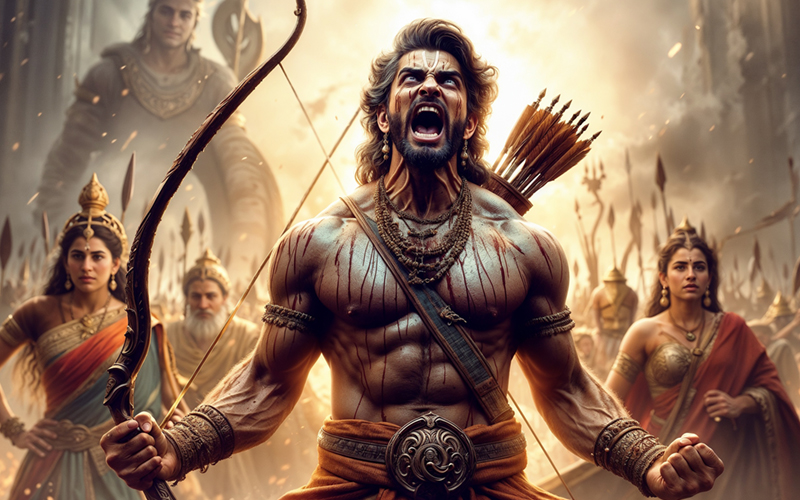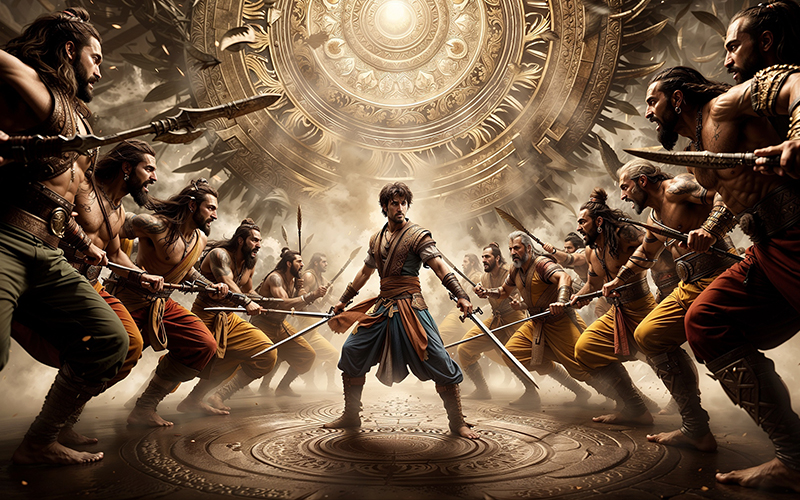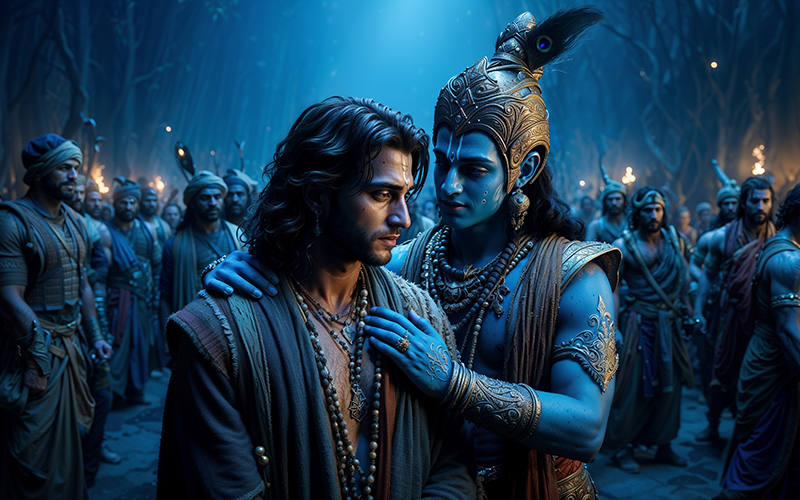Physical Address
Empirical System, 105 First Floor Pitru Krupa, Opp. R.K. Desai College, Koparli Road, Vapi (Gujarat) 396 191
Physical Address
Empirical System, 105 First Floor Pitru Krupa, Opp. R.K. Desai College, Koparli Road, Vapi (Gujarat) 396 191

In the grand tapestry of the Mahabharata, every thread tells a story of human emotion and divine wisdom. We often celebrate the righteous victories, but some of the most profound lessons lie in moments of near-failure, where human passion collides with divine strategy.
One such moment is the aftermath of Abhimanyu’s tragic death, which pushed the great warrior Arjuna to his emotional brink. His subsequent vow was born from righteous rage, but it was a vow that almost led to his own demise. This is the story of how that vow was saved—not by more anger, but by the divine silence and strategy of Lord Krishna.
The thirteenth day of the Kurukshetra war dawned heavy with dread. On this day, the Kauravas, led by Guru Drona, unleashed the dreaded Chakravyuha—a circular military formation designed to be an inescapable trap.
The brave Abhimanyu, son of Arjuna, knew how to enter it but not how to escape. Yet, with unparalleled courage, he plunged into the heart of the enemy lines, single-handedly creating chaos. But the promise of his brothers to follow and protect him was broken when Jayadratha, King of Sindhu, used a boon to block the Pandavas from entering.
Alone and surrounded, Abhimanyu faced a horrifying betrayal of the laws of war. Six of the greatest Kaurava maharathis—Drona, Karna, Ashwatthama, Duryodhana, Kripa, and Kritavarma—attacked the young warrior simultaneously.
As the narrator Sanjaya recounted to the blind king Dhritarashtra:
“Surrounded by warriors from all sides, Abhimanyu fought valiantly, but alas, struck by Karna’s arrows and overwhelmed by Drona’s forces, he fell. His body lay on the field, still holding his weapons, though lifeless.”
The light of the Pandava camp had been extinguished.

When Arjuna returned to camp that evening, the heavy silence spoke louder than any words. Upon learning of his son’s brutal and unjust death, his profound sorrow ignited into a firestorm of righteous rage. The world’s greatest archer was overcome by the most primal of human emotions: a father’s grief.
He learned how Jayadratha was the key to his son’s isolation and death. In that moment of blinding fury, Arjuna raised his divine bow, the Gandiva, and made a vow that shook the heavens and the earth.
“By my bow, Gandiva, I swear that by tomorrow’s sunset, I will slay Jayadratha! If I fail to do so, I shall cast myself into the fire and end my life!”
This was no mere threat; it was a Sanyasi’s vow, binding and absolute. While born from a place of justice, it was a strategic blunder. Arjuna had publicly announced his target and his deadline, giving his enemies a clear roadmap to defeat him. All they had to do was protect Jayadratha for a single day, and their greatest adversary would destroy himself.
While everyone else was shaken by Arjuna’s vow, Lord Krishna remained a pillar of calm. He understood the depths of Arjuna’s pain, but He also saw the trap Arjuna had just set for himself. This was a pivotal moment where divine consciousness had to guide human emotion.
Placing a comforting hand on his friend’s shoulder, Krishna spoke, not to quell his anger, but to channel it.
“Partha, I understand your pain. Abhimanyu fought with the valor of a lion, and he has attained the highest realms of warriors. But remember, grief must not cloud your judgment. Your mind must remain clear… Channel your pain into purpose.”
This is the first great lesson: Emotion is energy. Uncontrolled, it leads to self-destructive vows. But when guided by a higher purpose—by Dharma—that same energy becomes an unstoppable force for good. Krishna didn’t say, “Don’t be angry.” He said, “Use your anger. Let it fuel your arrows, not your ego.”

The next day, the Kaurava army formed an impenetrable fortress around Jayadratha. They were not fighting to win the war; they were simply fighting to run out the clock. Arjuna, fueled by his mission, fought like a tempest, decimating entire legions. Yet, as the sun began its descent, his target remained agonizingly out of reach.
Doubt and despair began to creep into Arjuna’s heart. His vow was about to backfire.
This is where Krishna, the master strategist, revealed that the battle is fought not just on the physical plane, but on the plane of consciousness. Seeing Arjuna’s waning hope, Krishna performed a divine leela (a divine play). He used his Sudarshana Chakra to create a cosmic illusion, cloaking the sun and plunging the battlefield into a false twilight.
Thinking the day was over and they had won, the Kauravas erupted in celebration. Jayadratha, foolishly and arrogantly, emerged from his protective shell to mock a “defeated” Arjuna.
In that perfect moment, Krishna smiled and dispelled the illusion. The sun reappeared in the sky, still minutes away from setting.
“Now, Partha! The time is now!” Krishna commanded.
Arjuna, his focus instantly restored, drew the divine Pasupatastra. The arrow, carrying a father’s love, a warrior’s resolve, and a devotee’s faith, flew true. It severed Jayadratha’s head, fulfilling the vow and upholding Dharma.
Arjuna had fulfilled his vow, but the victory was not his alone. It was a victory of divine strategy over raw emotion. It was a testament to the fact that even righteous anger, if not tempered with wisdom and silence, can lead to ruin.
Krishna’s intervention teaches us a profound spiritual lesson:
Arjuna’s love for Abhimanyu guided his hand, but it was his faith in Krishna’s wisdom that secured the victory. In our own lives, when we are faced with overwhelming grief or anger, let us remember this story. Let us pause, quiet the roaring mind, and allow divine strategy to illuminate our path forward.
What are your thoughts on this story? Share how you find strength and clarity in moments of emotional turmoil in the comments below!